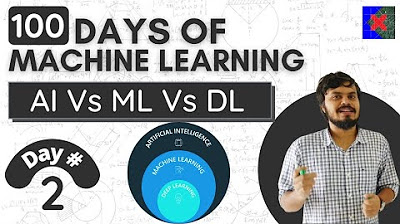How AI Is Saving Humanity
Summary
TLDRThis video script explores the potential and pitfalls of artificial intelligence, referencing Irving John Good's 1965 prediction of an 'ultra-intelligent machine.' It discusses AI's dual-edged impact, from advancing medical treatments and aiding those with disabilities to the ethical concerns in its development. The script highlights AI's role in healthcare, education, and beyond, emphasizing the need for ethical stewardship to ensure AI's benefits outweigh its risks, with a call to action for individuals to join the tech field to influence AI's future positively.
Takeaways
- 🧠 The concept of an 'Ultra Intelligent Machine' was first proposed by mathematician Irving John Good in 1965, suggesting a machine that could design even smarter machines, potentially surpassing human intelligence.
- 🛠️ Human history is marked by the invention and use of tools to advance civilization, and AI represents the next significant leap in this progression.
- 🔄 AI has the dual potential to either cause harm or benefit humanity, much like previous inventions, but with greater magnitude due to its intelligence.
- 💡 The ethical use of AI is crucial, and individuals entering the tech field can influence its development towards positive outcomes.
- 🎓 Education platforms like Coursera offer opportunities to start a career in tech without a traditional college degree, emphasizing accessibility in the tech industry.
- 🏥 AI is revolutionizing healthcare, particularly in cancer treatment, by accelerating drug development and improving medical imaging analysis.
- 🦠 AI's pattern recognition capabilities can assist in diagnosing diseases, as demonstrated by its contribution to identifying a tick-borne disease in a dog.
- 🦾 AI technologies can empower individuals with disabilities, offering tools for independence and better interaction with the world.
- 🧙♂️ Mental health support is being augmented by AI, providing virtual therapy and reducing the stigma associated with seeking help.
- 📚 AI has transformative potential in education, offering personalized learning experiences and the ability to bridge gaps in resource distribution.
- 💻 The ability of AI to write and debug code can assist learners, potentially making coding more accessible and encouraging better learning practices.
- 🌐 AI can support the preservation of cultural heritage and languages, even those that are nearly extinct, by digitizing and analyzing cultural data.
Q & A
Who made the statement about the first Ultra intelligent machine being the last invention humans would need?
-The statement was made by the mathematician Irving John Good in 1965.
What potential dual impact does the script suggest artificial intelligence could have on humanity?
-The script suggests that artificial intelligence could both end our species if misused and save us if used correctly.
How does the script relate the invention of AI to the invention of the wheel and the light bulb?
-The script implies that, like the wheel and the light bulb, AI could drastically change our lives, but it also emphasizes the importance of knowing how to use AI properly to avoid negative outcomes.
What is the role of AI in advancing cancer treatment according to the script?
-AI is helping to advance cancer treatment by quickly understanding how cancerous cells become resistant to anti-cancer drugs and by improving cancer drug development through predictive analysis and data scanning.
How can AI assist in medical imaging and what benefits does it provide?
-AI can analyze CT scans, X-rays, and MRIs to find abnormalities that a human radiologist might miss, thus improving the productivity of medical professionals and potentially leading to a healthcare revolution.
What is the potential impact of AI on the shortage of primary care physicians by 2034?
-AI tools might help bridge the gap between the required care and the number of physicians available, potentially easing the impact of the projected shortage.
How did AI assist in diagnosing an unknown tick-borne disease in a dog as mentioned in the script?
-The dog's owner input the symptoms into GPT4, which hypothesized the condition and suggested probable diagnoses, speeding up the time it took to diagnose the illness and contributing to the dog's recovery.
In what ways can AI support people with disabilities and promote independence?
-AI can be incorporated into apps to help the blind and visually impaired interpret the world around them and provide real-time captioning software for those with hearing impairments, making it easier to create interactive tools for both physical and mental accessibility.
How can AI be utilized in the field of mental health according to the script?
-AI can assist in creating diagnostic tools, personalized treatment plans, and provide virtual therapy through chatbots and interactive platforms, increasing access to care and reducing stigma associated with seeking help.
What is the potential of AI in education and how can it address educational inequality?
-AI has the potential to customize learning experiences to individual students, merge the gap between well-resourced and under-resourced schools, and encourage a more inclusive and effective learning environment, thus reducing educational inequality.
How does the script suggest AI can help with the preservation and dissemination of human knowledge and cultural heritage?
-AI can assist in the digitization, organization, and analysis of vast amounts of cultural data, ensuring that future generations can learn from and appreciate the accomplishments of those who came before, and even help speak languages that are nearly extinct.
What are some of the potential inventions or solutions a superhumanly capable artificial general intelligence might bring, as suggested in the script?
-The script suggests that a superhumanly capable AGI could potentially cure cancer, death, and mental illness, solve climate change, enable space travel, facilitate mind uploading, provide cheap food, fusion energy, and usher in an era of abundance where people can focus on social, spiritual, artistic, and intellectual fulfillment.
Outlines

此内容仅限付费用户访问。 请升级后访问。
立即升级Mindmap

此内容仅限付费用户访问。 请升级后访问。
立即升级Keywords

此内容仅限付费用户访问。 请升级后访问。
立即升级Highlights

此内容仅限付费用户访问。 请升级后访问。
立即升级Transcripts

此内容仅限付费用户访问。 请升级后访问。
立即升级浏览更多相关视频

Machine Learning vs Deep Learning vs Artificial Intelligence | ML vs DL vs AI | Simplilearn

Nick Bostrom What happens when our computers get smarter than we are?

The Chinese Room - 60-Second Adventures in Thought (3/6)

Barbara Gallavotti | Che cosa pensa l'Intelligenza artificiale

🤖How AI Works? 🦾Artificial intelligence எப்படி வேலைசெய்கிறது? in Tamil #ai #artificialintelligence

AI Vs ML Vs DL for Beginners in Hindi
5.0 / 5 (0 votes)
